mind的用法
- 格式:doc
- 大小:124.00 KB
- 文档页数:3
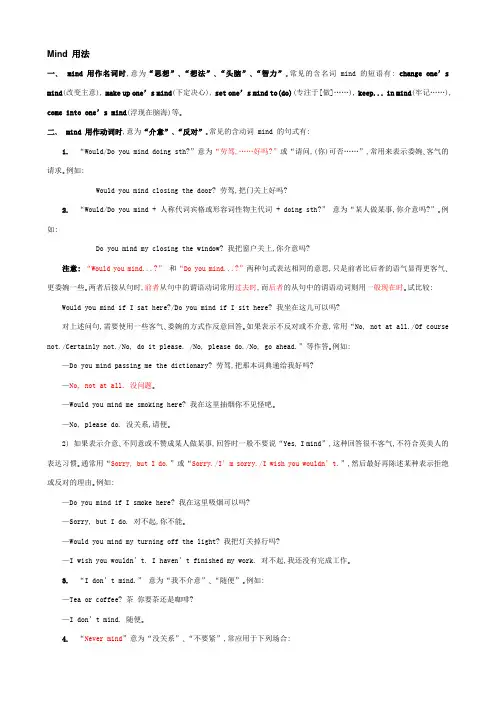
Mind 用法一、 mind 用作名词时,意为“思想”、“想法”、“头脑”、“智力”。常见的含名词 mind 的短语有: change one’s mind(改变主意), make up one’s mind(下定决心),set one’s mind to(do)(专注于[做]……), keep... in mind(牢记……), come into one’s mind(浮现在脑海)等。二、 mind 用作动词时,意为“介意”、“反对”。常见的含动词 mind 的句式有:1. “Would/Do you mind doing sth?”意为“劳驾,……好吗?”或“请问,(你)可否……”,常用来表示委婉、客气的请求。例如:Would you mind closing the door? 劳驾,把门关上好吗?2.“Would/Do you mind + 人称代词宾格或形容词性物主代词+ doing sth?” 意为“某人做某事,你介意吗?”。例如:Do you mind my closing the window? 我把窗户关上,你介意吗?注意: “Would you mind...?”和“Do you mind...?”两种句式表达相同的意思,只是前者比后者的语气显得更客气、更委婉一些。两者后接从句时,前者从句中的谓语动词常用过去时,而后者的从句中的谓语动词则用一般现在时。试比较: Would you mind if I sat here?/Do you mind if I sit here? 我坐在这儿可以吗?对上述问句,需要使用一些客气、委婉的方式作反意回答。如果表示不反对或不介意,常用“No, not at all./Of course not./Certainly not./No, do it please. /No, please do./No, go ahead.”等作答。例如:—Do you mind passing me the dictionary? 劳驾,把那本词典递给我好吗?—No, not at all. 没问题。—Would you mind me smoking here? 我在这里抽烟你不见怪吧。—No, please do. 没关系,请便。2) 如果表示介意、不同意或不赞成某人做某事,回答时一般不要说“Yes, I mind”,这种回答很不客气,不符合英美人的表达习惯。通常用“Sorry, but I do.”或“Sorry./I’m sorry./I wish you wouldn’t.”,然后最好再陈述某种表示拒绝或反对的理由。例如:—Do you mind if I smoke here? 我在这里吸烟可以吗?—Sorry, but I do. 对不起,你不能。—Would you mind my turning off the light? 我把灯关掉行吗?—I wish you wouldn’t. I haven’t finished my work. 对不起,我还没有完成工作。3. “I don’t mind.” 意为“我不介意”、“随便”。例如:—Tea or coffee? 茶你要茶还是咖啡?—I don’t mind. 随便。4. “Never mind”意为“没关系”、“不要紧”,常应用于下列场合:1) 回答对方的致歉。例如:—I’m sorry. I came in a hurry and forgot to bring food. 对不起,我来得匆忙,忘记带吃的了。—Never mind. You can have ours. 没关系,你可以吃我们的。2) 安慰对方。例如:—Did you watch the baseball match yesterday? 昨天你看棒球比赛了吗?—No, I missed it. By the time I got there, it had already finished. 没有,我错过了。当我到达那里时,比赛已经结束了。—Never mind. It was a boring match. 没关系。那是一场枯燥乏味的比赛。3) 回答对方的求助。例如:—Sorry to trouble you. 抱歉,麻烦您一下。—Never mind. What can I do for you? 没关系。我能为你做些什么呢?[链接中考]1. Would you mind_____more slowly? I can’t follow you.A. speakB. spokeC. spokenD. speaking2. Do you mind_____the radio a little bit? I am doing my homework.A. turning offB. to turn downC. turning downD. turning up3. —Would you mind opening the window?—_____.A. Of course, open itB. Not at allB. CertainlyC. No, don’t do it4. —Do you mind if I take the seat?—_____. It’s for a gentleman named Bill.A. Better notB. Never mindC. Of courseD. Not at all5. —It’s too hot. Would you mind my_____the window?—_____. Do it as you like, please!A. to open; OKB. opening; Certainly notC. closing; Of courseD. open; Good idea6. —Would you mind my smoking here?—_____.A. Not at allB. I have no ideaC. Yes, please7. Would you mind_____me how_____English words?A. tell; to rememberB. telling; rememberC. telling; to rememberD. tell; remember8. —Mary is ill. When shall we go to see her, tonight or tomorrow night?—_____. Either night is OK.A. I’m sureB. I’m afraid notC. I d on’t knowD. I don’t mind9. —I’m terribly sorry to have stepped on your foot.—_____.A. Don’t say thatB. Never mindC. You’re welcomeD. That’s right10. —Do you mind opening the door for me?—_____.A. Yes, of course notB. Yes, pleaseC. No, of course notD. No, you can’t open it Key: 1-5 DCBAB6-10 ACDBC(注:专业文档是经验性极强的领域,无法思考和涵盖全面,素材和资料部分来自网络,供参考。
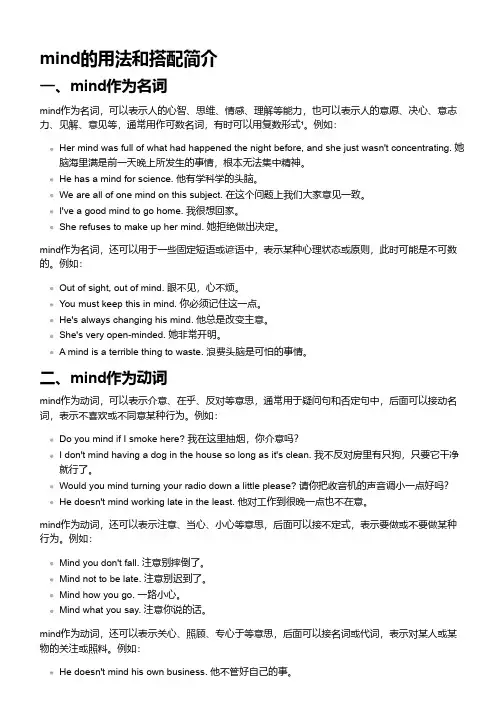
mind的用法和搭配简介一、mind作为名词mind作为名词,可以表示人的心智、思维、情感、理解等能力,也可以表示人的意愿、决心、意志力、见解、意见等,通常用作可数名词,有时可以用复数形式¹。
例如:Her mind was full of what had happened the night before, and she just wasn't concentrating. 她脑海里满是前一天晚上所发生的事情,根本无法集中精神。
He has a mind for science. 他有学科学的头脑。
We are all of one mind on this subject. 在这个问题上我们大家意见一致。
I've a good mind to go home. 我很想回家。
She refuses to make up her mind. 她拒绝做出决定。
mind作为名词,还可以用于一些固定短语或谚语中,表示某种心理状态或原则,此时可能是不可数的。
例如:Out of sight, out of mind. 眼不见,心不烦。
You must keep this in mind. 你必须记住这一点。
He's always changing his mind. 他总是改变主意。
She's very open-minded. 她非常开明。
A mind is a terrible thing to waste. 浪费头脑是可怕的事情。
二、mind作为动词mind作为动词,可以表示介意、在乎、反对等意思,通常用于疑问句和否定句中,后面可以接动名词,表示不喜欢或不同意某种行为。
例如:Do you mind if I smoke here? 我在这里抽烟,你介意吗?I don't mind having a dog in the house so long as it's clean. 我不反对房里有只狗,只要它干净就行了。
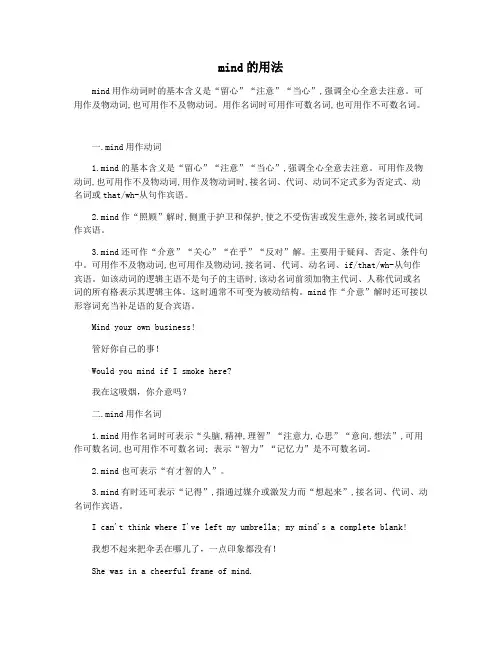
mind的用法mind用作动词时的基本含义是“留心”“注意”“当心”,强调全心全意去注意。
可用作及物动词,也可用作不及物动词。
用作名词时可用作可数名词,也可用作不可数名词。
一.mind用作动词1.mind的基本含义是“留心”“注意”“当心”,强调全心全意去注意。
可用作及物动词,也可用作不及物动词,用作及物动词时,接名词、代词、动词不定式多为否定式、动名词或that/wh-从句作宾语。
2.mind作“照顾”解时,侧重于护卫和保护,使之不受伤害或发生意外,接名词或代词作宾语。
3.mind还可作“介意”“关心”“在乎”“反对”解。
主要用于疑问、否定、条件句中。
可用作不及物动词,也可用作及物动词,接名词、代词、动名词、if/that/wh-从句作宾语。
如该动词的逻辑主语不是句子的主语时,该动名词前须加物主代词、人称代词或名词的所有格表示其逻辑主体。
这时通常不可变为被动结构。
mind作“介意”解时还可接以形容词充当补足语的复合宾语。
Mind your own business!管好你自己的事!Would you mind if I smoke here?我在这吸烟,你介意吗?二.mind用作名词1.mind用作名词时可表示“头脑,精神,理智”“注意力,心思”“意向,想法”,可用作可数名词,也可用作不可数名词; 表示“智力”“记忆力”是不可数名词。
2.mind也可表示“有才智的人”。
3.mind有时还可表示“记得”,指通过媒介或激发力而“想起来”,接名词、代词、动名词作宾语。
I can't think where I've left my umbrella; my mind's a complete blank!我想不起来把伞丢在哪儿了,一点印象都没有!She was in a cheerful frame of mind.她心情愉快。
感谢您的阅读,祝您生活愉快。
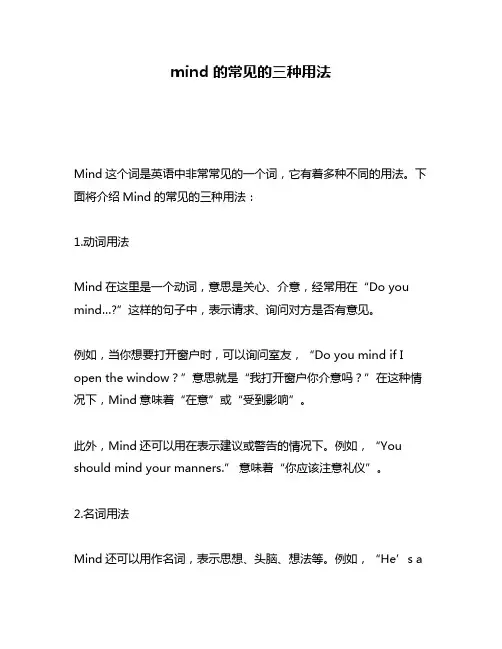
mind 的常见的三种用法Mind这个词是英语中非常常见的一个词,它有着多种不同的用法。
下面将介绍Mind的常见的三种用法:1.动词用法Mind在这里是一个动词,意思是关心、介意,经常用在“Do you mind…?”这样的句子中,表示请求、询问对方是否有意见。
例如,当你想要打开窗户时,可以询问室友,“Do you mind if I open the window?”意思就是“我打开窗户你介意吗?”在这种情况下,Mind意味着“在意”或“受到影响”。
此外,Mind还可以用在表示建议或警告的情况下。
例如,“You should mind your manners.” 意味着“你应该注意礼仪”。
2.名词用法Mind还可以用作名词,表示思想、头脑、想法等。
例如,“He’s agreat mind in the field of science.” 意味着“他在科学领域是一位伟大的思想家”。
Mind还可以用作短语“in one’s mind”,表示在某人的脑海中。
例如,“Your image is always in my mind.” 意为“你的形象总是在我脑海中”。
此外,Mind还可以用于构成一些合成词,例如:“mind-boggling”意味着“令人难以置信的”。
3.动名词用法Mind还可以用作动名词,意思是“在意”或“照顾”。
例如,“I don’t mind doing the dishes.” 意味着“我不介意洗碗”。
还有一些常见的动词短语,如“mind your own business”(不要干涉别人的事情)、“mind the gap”(注意间隙)等也是使用Mind的常见方式。
总的来说,Mind是一个非常常见和多义的词汇,适用于多种情境和用途中。
它既可以作为动词、名词,也可以用在动名词等形式中,在语言交际中扮演着重要的角色。
对于学习英语的人而言,深入理解Mind的用法,能够帮助提高英语交流的能力,让自己的英语表达更加地自如。
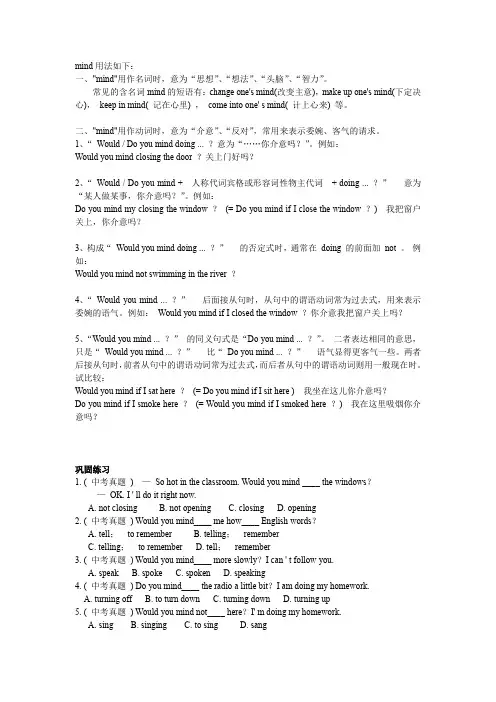
mind用法如下:一、"mind"用作名词时,意为“思想”、“想法”、“头脑”、“智力”。
常见的含名词mind的短语有:change one's mind(改变主意),make up one's mind(下定决心),keep in mind( 记在心里) ,come into one' s mind( 计上心来) 等。
二、"mind"用作动词时,意为“介意”、“反对”,常用来表示委婉、客气的请求。
1、“Would / Do you mind doing ... ?意为“……你介意吗?”。
例如:Would you mind closing the door ?关上门好吗?2、“Would / Do you mind + 人称代词宾格或形容词性物主代词+ doing ... ?”意为“某人做某事,你介意吗?”。
例如:Do you mind my closing the window ?(= Do you mind if I close the window ?) 我把窗户关上,你介意吗?3、构成“Would you mind doing ... ?”的否定式时,通常在doing 的前面加not 。
例如:Would you mind not swimming in the river ?4、“Would you mind ... ?”后面接从句时,从句中的谓语动词常为过去式,用来表示委婉的语气。
例如:Would you mind if I closed the window ?你介意我把窗户关上吗?5、“Would you mind ... ?”的同义句式是“Do you mind ... ?”。
二者表达相同的意思,只是“Would you mind ... ?”比“Do you mind ... ?”语气显得更客气一些。
两者后接从句时,前者从句中的谓语动词常为过去式,而后者从句中的谓语动词则用一般现在时。
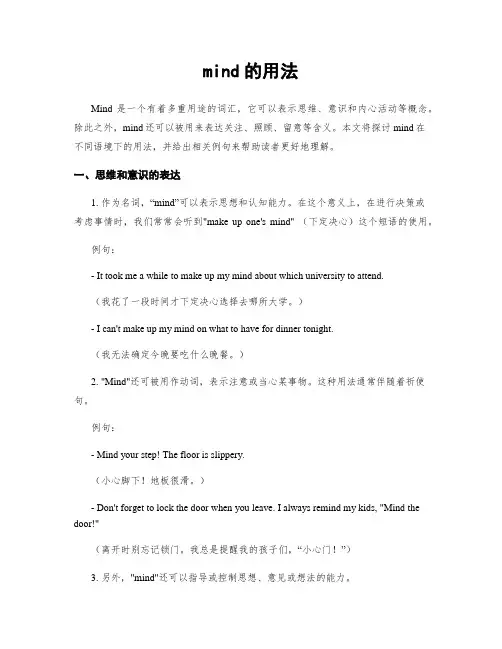
mind的用法Mind是一个有着多重用途的词汇,它可以表示思维、意识和内心活动等概念。
除此之外,mind还可以被用来表达关注、照顾、留意等含义。
本文将探讨mind在不同语境下的用法,并给出相关例句来帮助读者更好地理解。
一、思维和意识的表达1. 作为名词,“mind”可以表示思想和认知能力。
在这个意义上,在进行决策或考虑事情时,我们常常会听到"make up one's mind" (下定决心)这个短语的使用。
例句:- It took me a while to make up my mind about which university to attend.(我花了一段时间才下定决心选择去哪所大学。
)- I can't make up my mind on what to have for dinner tonight.(我无法确定今晚要吃什么晚餐。
)2. "Mind"还可被用作动词,表示注意或当心某事物。
这种用法通常伴随着祈使句。
例句:- Mind your step! The floor is slippery.(小心脚下!地板很滑。
)- Don't forget to lock the door when you leave. I always remind my kids, "Mind the door!"(离开时别忘记锁门。
我总是提醒我的孩子们,“小心门!”)3. 另外,"mind"还可以指导或控制思想、意见或想法的能力。
- Keep an open mind and listen to other people's opinions.(保持开放的心态,听取他人的意见。
)- It's important to have a creative mind in order to solve difficult problems.(具备创造性思维以解决困难问题是很重要的。
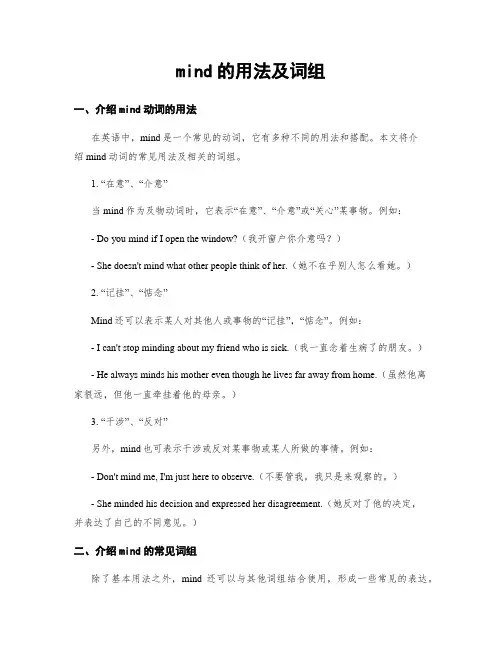
mind的用法及词组一、介绍mind动词的用法在英语中,mind是一个常见的动词,它有多种不同的用法和搭配。
本文将介绍mind动词的常见用法及相关的词组。
1. “在意”、“介意”当mind作为及物动词时,它表示“在意”、“介意”或“关心”某事物。
例如:- Do you mind if I open the window?(我开窗户你介意吗?)- She doesn't mind what other people think of her.(她不在乎别人怎么看她。
)2. “记挂”、“惦念”Mind还可以表示某人对其他人或事物的“记挂”,“惦念”。
例如:- I can't stop minding about my friend who is sick.(我一直念着生病了的朋友。
)- He always minds his mother even though he lives far away from home.(虽然他离家很远,但他一直牵挂着他的母亲。
)3. “干涉”、“反对”另外,mind也可表示干涉或反对某事物或某人所做的事情。
例如:- Don't mind me, I'm just here to observe.(不要管我,我只是来观察的。
)- She minded his decision and expressed her disagreement.(她反对了他的决定,并表达了自己的不同意见。
)二、介绍mind的常见词组除了基本用法之外,mind还可以与其他词组结合使用,形成一些常见的表达。
1. “make up one's mind”这一词组表示“做出决定”,通常用于强调某人必须做出一个重要的选择。
例如:- After careful consideration, she finally made up her mind to quit her job.(经过深思熟虑,她最终决定辞职。
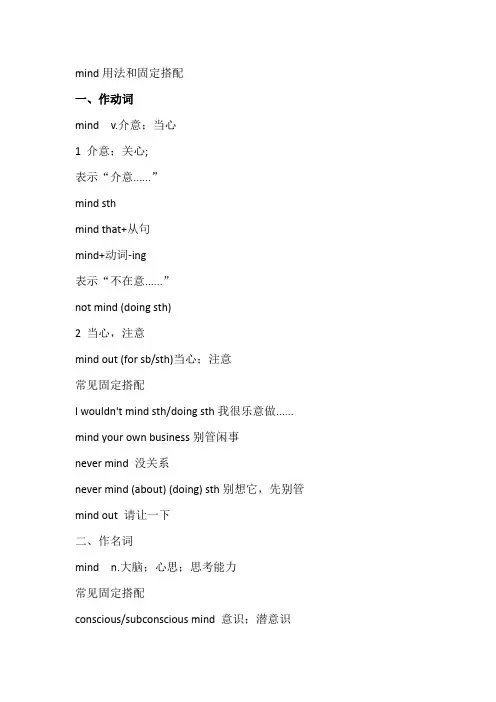
mind用法和固定搭配一、作动词mind v.介意;当心1 介意;关心;表示“介意......”mind sthmind that+从句mind+动词-ing表示“不在意......”not mind (doing sth)2 当心,注意mind out (for sb/sth)当心;注意常见固定搭配I wouldn't mind sth/doing sth我很乐意做...... mind your own business别管闲事never mind 没关系never mind (about) (doing) sth别想它,先别管mind out 请让一下二、作名词mind n.大脑;心思;思考能力常见固定搭配conscious/subconscious mind 意识;潜意识bear/keep sb/sth in mind 或者bear/keep in mind that...将......记在心中be/go out of one's mind 心智失常;发疯be of one/the same mind (about sb/sth)对......意见一致;对......看法相同bring/call sb/sth to mind 想起;记起come to mind突然记起(或想到)have a mind of one's own有主见;能自作决定make up one's mind 做出决定;下定决心on one's mind 挂在心上;惦念put/get sth out of one's mind 不再想;有意忘记to my mind 依我看;以我之见。
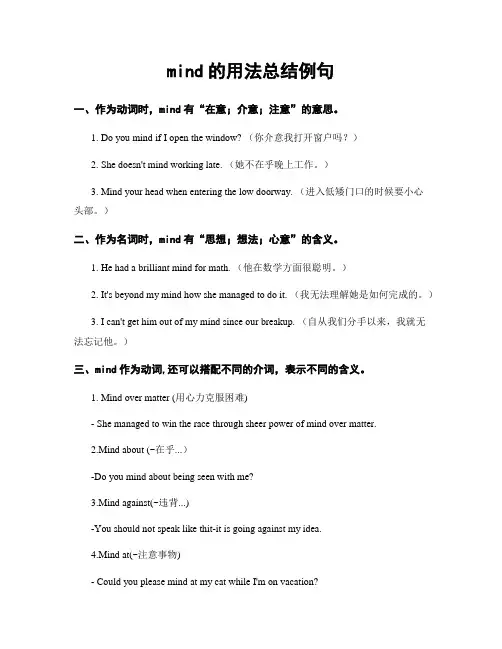
mind的用法总结例句一、作为动词时,mind有“在意;介意;注意”的意思。
1. Do you mind if I open the window? (你介意我打开窗户吗?)2. She doesn't mind working late. (她不在乎晚上工作。
)3. Mind your head when entering the low doorway. (进入低矮门口的时候要小心头部。
)二、作为名词时,mind有“思想;想法;心意”的含义。
1. He had a brilliant mind for math. (他在数学方面很聪明。
)2. It's beyond my mind how she managed to do it. (我无法理解她是如何完成的。
)3. I can't get him out of my mind since our breakup. (自从我们分手以来,我就无法忘记他。
)三、mind作为动词,还可以搭配不同的介词,表示不同的含义。
1. Mind over matter (用心力克服困难)- She managed to win the race through sheer power of mind over matter.2.Mind about (~在乎...)-Do you mind about being seen with me?3.Mind against(~违背...)-You should not speak like thit-it is going against my idea.4.Mind at(~注意事物)- Could you please mind at my cat while I'm on vacation?5.Mind by(~控制...")-Her life was made difficult by fear which seemed to have he control.四、Mind 在句子中作为连接词(conj.)时,引导宾语从句,并表示“如果;要是”的意思。
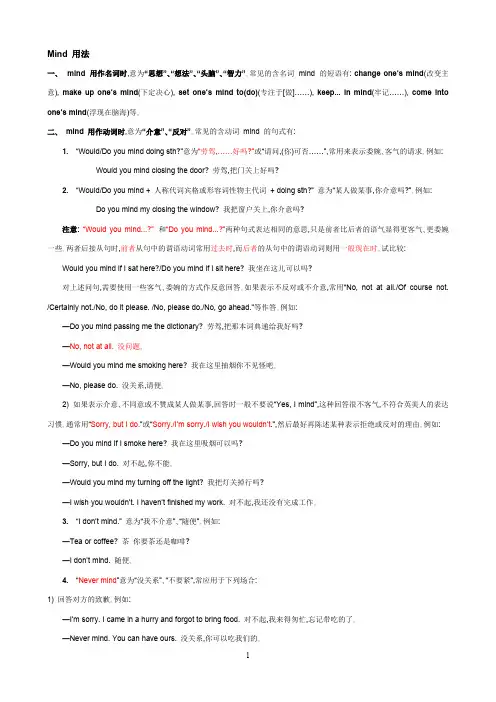
Mind 用法一、mind 用作名词时,意为“思想”、“想法”、“头脑”、“智力”。常见的含名词mind 的短语有: change one’s mind(改变主意), make up one’s mind(下定决心),set one’s mind to(do)(专注于[做]……), keep... in mind(牢记……), come into one’s mind(浮现在脑海)等。二、mind 用作动词时,意为“介意”、“反对”。常见的含动词mind 的句式有: 1. “Would/Do you mind doing sth?”意为“劳驾,……好吗?”或“请问,(你)可否……”,常用来表示委婉、客气的请求。例如: Would you mind closing the door? 劳驾,把门关上好吗? 2.“Would/Do you mind + 人称代词宾格或形容词性物主代词+ doing sth?” 意为“某人做某事,你介意吗?”。例如: Do you mind my closing the window? 我把窗户关上,你介意吗? 注意: “Would you mind...?”和“Do you mind...?”两种句式表达相同的意思,只是前者比后者的语气显得更客气、更委婉一些。两者后接从句时,前者从句中的谓语动词常用过去时,而后者的从句中的谓语动词则用一般现在时。试比较: Would you mind if I sat here?/Do you mind if I sit here? 我坐在这儿可以吗? 对上述问句,需要使用一些客气、委婉的方式作反意回答。如果表示不反对或不介意,常用“No, not at all./Of course not. /Certainly not./No, do it please. /No, please do./No, go ahead.”等作答。例如: —Do you mind passing me the dictionary? 劳驾,把那本词典递给我好吗? —No, not at all. 没问题。 —Would you mind me smoking here? 我在这里抽烟你不见怪吧。 —No, please do. 没关系,请便。 2) 如果表示介意、不同意或不赞成某人做某事,回答时一般不要说“Yes, I mind”,这种回答很不客气,不符合英美人的表达习惯。通常用“Sorry, but I do.”或“Sorry./I’m sorry./I wish you wouldn’t.”,然后最好再陈述某种表示拒绝或反对的理由。例如: —Do you mind if I smoke here? 我在这里吸烟可以吗? —Sorry, but I do. 对不起,你不能。 —Would you mind my turning off the light? 我把灯关掉行吗? —I wish you wouldn’t. I haven’t finished my work. 对不起,我还没有完成工作。 3. “I don’t mind.” 意为“我不介意”、“随便”。例如: —Tea or coffee? 茶你要茶还是咖啡? —I don’t mind. 随便。 4. “Never mind”意为“没关系”、“不要紧”,常应用于下列场合:1)回答对方的致歉。例如: —I’m sorry. I came in a hurry and forgot to bring food. 对不起,我来得匆忙,忘记带吃的了。 —Never mind. You can have ours. 没关系,你可以吃我们的。1给大家推荐一个英语微信群-Empty Your Cup英语微信群是目前学习英语最有效的方法,群里都是说英语,没有半个中文,而且规则非常严格,是一个超级不错的英语学习环境,群里有好多英语超好的超牛逼的人,还有鬼佬和外国美眉。
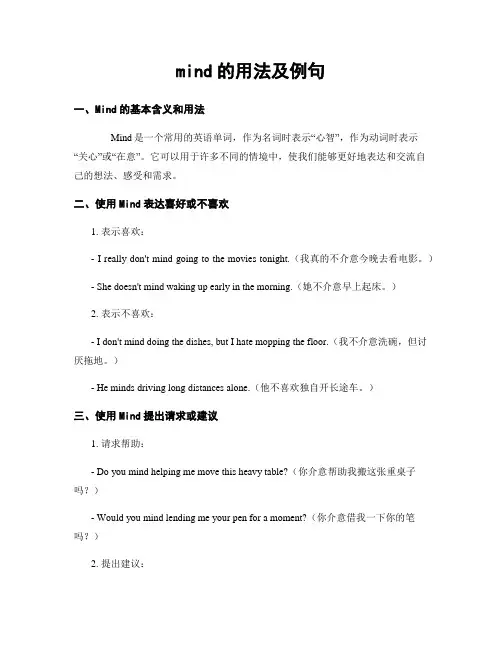
mind的用法及例句一、Mind的基本含义和用法Mind是一个常用的英语单词,作为名词时表示“心智”,作为动词时表示“关心”或“在意”。
它可以用于许多不同的情境中,使我们能够更好地表达和交流自己的想法、感受和需求。
二、使用Mind表达喜好或不喜欢1. 表示喜欢:- I really don't mind going to the movies tonight.(我真的不介意今晚去看电影。
)- She doesn't mind waking up early in the morning.(她不介意早上起床。
)2. 表示不喜欢:- I don't mind doing the dishes, but I hate mopping the floor.(我不介意洗碗,但讨厌拖地。
)- He minds driving long distances alone.(他不喜欢独自开长途车。
)三、使用Mind提出请求或建议1. 请求帮助:- Do you mind helping me move this heavy table?(你介意帮助我搬这张重桌子吗?)- Would you mind lending me your pen for a moment?(你介意借我一下你的笔吗?)2. 提出建议:- I think we should go for a walk to clear our minds after such a long day at work.(我认为我们应该散步放松一下,因为今天工作了很长时间。
)- Why don't you try meditation to calm your mind?(你为什么不试试冥想平静一下心灵呢?)四、使用Mind表达关注或忧虑1. 表达关心:- I hope you're feeling better. Mind if I check on you later?(希望你感觉好些。
几年,考查mind一词的题目屡见不鲜。
现对其用法作一归纳: 一、mind用作名词时,意为“思想”、“想法”、“头脑”、“智力”。
常见的含名词mind的短语有:change one’s mind(改变主意),make up one’s mind(下定决心),set one’s mind to (do) (专注于……),keep in mind(记在心里),come into one’s mind(计上心来)等。
二、mind用作动词时,意为“介意”、“反对”,常用来表示委婉、客气的请求。
含动词mind的常见句式有: 1) “Would/Do you mind doing ...?意为“……你介意吗?”。
例如: Would you mind closing the door?关上门好吗? 2) “Would/Do you mind + 人称代词宾格或形容词性物主代词 + doing ...?” 意为“某人做某事,你介意吗?”。
例如: Do you mind my closing the window?(= Do you mind if I close the window?) 我把窗户关上,你介意吗? 构成“Would you mind doing ...?” 的否定式时,通常在doing的前面加not。
例如: Would you mind not swimming in the river? Would you mind not being late again? “Would you mind ...?” 后面接从句时,从句中的谓语动词常为过去式,用来表示委婉的语气。
例如: Would you mind if I closed the window?你介意我把窗户关上吗? Would you mind if I turned up the radio?我把收音机声音开大点,你反对吗? “Would you mind ...?” 的同义句式是“Do you mind ...?”。
mind用法详解总结今天给大家带来mind 用法详解,快来一起学习吧,下面就和大家分享,来欣赏一下吧。
mind 用法详解一、用作动词表示“介意”、“在乎”等,其后接动词时要用动名词;表示“注意”、“当心”等,其后接动词时要用不定式。
如:Do you mind helping us? 请你帮我们一下忙好吗?I’m sure he wouldn’t mind your going with us. 我肯定他不会反对你同我们一起去。
There will be a meeting tonight. Mind not to be late. 今晚有会议, 注意别迟到。
二、用作名词表示“脑子”、“心思”等,通常用作可数名词。
如:I’ve a good mind to go home. 我很想回家。
He has a mind for science. 他有学科学的头脑。
We are all of one mind on this subject. 在这个问题上我们大家意见一致。
注:在某些谚语或固定短语中,可能是不可数的。
如:Out of sight, out of mind. 眼不见,心不烦。
You must keep this in mind. 你必须记住这一点。
三、用于Would [Do] you mind...?1. 该句型意为“请你……好不好?”、“倘若……你见怪吗?”,用would 比用do 更客气委婉,但通常不用will;其后可接动名词(但不接不定式)或if从句;接动名词时,根据情况可以带逻辑主语;接if 从句时,若句首用的是Would,从句谓语通常要用过去式。
比较:我在这儿抽烟你介意吗?正:Would [Do] you mind my smoking here?正:Do you mind if I smoke here?正:Would you mind if I smoked here?2. 对该句型的回答与汉语的习惯不同,注意回答是针对mind 而言的,即:(1)表示不同意,可用:Yes, I do mind./Please don’t... / Betternot, please. / I’d rather you didn’t./I’m sorry, but... 等。
mind 的用法“mind”是一个英语单词,有多个含义和用法。
以下是一些常见的用法:1. 作为名词,表示“头脑”、“智力”、“思维”。
例如:She has a lively mind. 她思维敏捷。
He has a weak mind. 他意志薄弱。
2. 作为动词,表示“介意”、“关心”、“注意”。
例如:Do you mind if I smoke? 你介意我抽烟吗?She minds very much what people think of her. 她很在意别人对她的看法。
3. 与介词搭配使用,表示“在...方面用心”、“集中精力”。
例如:I must mind my own business. 我必须管好自己的事。
He minds the baby while his wife is out. 他妻子外出时,他照看孩子。
4. 表示“建议”、“劝告”。
例如:Mind your own business! 少管闲事!Mind the steps, they're slippery. 当心台阶,很滑。
5. 与其他动词或短语搭配使用,表示“专心致志”、“注意”、“留心”。
例如:Mind the traffic when crossing the road. 过马路时注意车辆。
Mind the gap between the train and the platform. 注意列车与站台之间的空隙。
6. 表示“介意”、“在乎”。
例如:Do you mind if I use your phone? 你介意我用你的电话吗?She doesn't mind what she eats as long as it's filling. 她不在乎吃什么,只要能填饱肚子就行。
mind用法详解总结今日给大家带来mind 用法详解,快来一起学习吧,下面我就和大家共享,来观赏一下吧。
mind 用法详解一、用作动词表示“介意”、“在乎”等,其后接动词时要用动名词;表示“留意”、“当心”等,其后接动词时要用不定式。
如:Do you mind helping us? 请你帮我们一下忙好吗?I’m sure he wouldn’t mind your going with us. 我确定他不会反对你同我们一起去。
There will be a meeting tonight. Mind not to be late. 今晚有会议,留意别迟到。
二、用作名词表示“脑子”、“心思”等,通常用作可数名词。
如:I’ve a good mind to go home. 我很想回家。
He has a mind for science. 他有学科学的头脑。
We are all of one mind on this subject. 在这个问题上我们大家意见全都。
注:在某些谚语或固定短语中,可能是不行数的。
如:Out of sight, out of mind. 眼不见,心不烦。
You must keep this in mind. 你必需记住这一点。
三、用于Would [Do] you mind...?1. 该句型意为“请你……好不好?”、“如果……你见怪吗?”,用would 比用do 更客气委婉,但通常不用will;其后可接动名词(但不接不定式)或if从句;接动名词时,依据状况可以带规律主语;接if 从句时,若句首用的是Would,从句谓语通常要用过去式。
比较:我在这儿抽烟你介意吗?正:Would [Do] you mind my smoking here?正:Do you mind if I smoke here?正:Would you mind if I smoked here?2. 对该句型的回答与汉语的习惯不同,留意回答是针对mind 而言的,即:(1)表示不同意,可用:Yes, I do mind./Please don’t... / Betternot, please. / I’d rather you didn’t./I’m sorry, but... 等。
mind的用法一、mind作可数名词,意为"脑子;想法;记性"。
An idea has just come into my mind. 我刚才想到一个主意。
I can't think where I've left my umbrella; my mind is a complete blank!我想不起来把伞落哪儿了;一点儿印象都没有!二、mind作动词。
1. 意为"当心;注意",后跟名词或从句,也可单独使用。
Mind the step! 小心台阶!Now mind! You must hurry home. 注意啦!你必须赶快回家。
2. 意为"介意;在乎",主要用于疑问句和否定句。
①作不及物动词。
Do you mind if I call you later? 我晚一点儿打电话给你好吗?注意:Do (Would) you mind if...句型用来表示请求对方的许可,即询问对方"是否介意(说话人)做某事"。
用Do开头时表示说话人比较直率,故if从句谓语用一般现在时态;用Would开头时则表示说话人语气较为委婉,故if从句谓语用虚拟语气,即一般过去时态。
但无论以Do 还是以Would开头,其答语相同:对该句型的回答与汉语的习惯不同,注意回答是针对mind而言的,即:(1)表示不同意,可用Yes, I do mind . / Please don't .../ Better not,please ./ I'd rather you didn't ./ I'm sorry,but... 等。
(2)表示同意,可用:Oh,no,please . / No, not at all . / Not at all ./ certainly not . / Of coursr not . / No, go ahead .等②作及物动词,后面通常接名词、代词、V-ing形式、复合结构、从句等。
mind的用法整理mind有留心;注意;头脑;精神等意思,那么你知道mind的常见用法都有哪些吗?下面店铺给大家整理了一些有关mind的用法和短语例句,欢迎大家参考学习!mind的用法整理mind的用法1:作动词1.意为"当心;注意",后跟名词或从句,也可单独使用.如:Mind the step!小心台阶!Now mind!You must hurry home.注意啦!你必须赶快回家.2.意为"介意;在乎",主要用于疑问句和否定句.①作及物动词,后面通常接名词、代词、复合结构、V-ing形式、从句等.如:Would you mind my closing the window?你介意我关上窗户吗?注意:Do (Would) you mind doing sth.这一句型通常用来表示请他人做某事,常译为\"可否请你做.\"或\"劳驾你做.\",多用Would开头,用Do的情况较少.Would you mind making some room for the patient?请你给这位病人让点儿地方出来行吗?②作不及物动词.如:Do you mind if I call you later?我晚一点儿打电话给你好吗?mind的用法2:作名词1.可表示“头脑,精神,理智”“注意力,心思”“意向,想法”,可用作可数名词,也可用作不可数名词; 表示“智力”“记忆(力)”是不可数名词。
2.也可表示“有才智的人”。
mind的用法短语:change one\'s mind 改变主意;keep...in mind记住never mind不要紧have a good mind to非常想…;极有意…make up one's mind决心;决定put sb.in mind of sb.or sth.使想起;提醒(某人)call to mind回忆起;记起never you mind没你的事mind的用法例句:1. The opportunity had gone. His mind scrabbled for alternatives.机会已经失去。
●mind的用法n.头脑, 智力, 精神, 情绪vi.介意, 照顾, 留心, ▲Would/Do you mind+(sb's) doing...? Would youmind my/me smoking here? 回答:不介意:No,not at all./No. Of course not 介意:I'd rather you didn't ...I'm sorry.../Sorry.../You'd better not. ▲Do you mind if sb. does sth...? Do you mind if I smoke here? ▲Would you mind if sb. did...?(虚拟语气)eg: 1).Would you mind if I broke the news to your son? ★make up one's mind(s);下决心★change one's mind 改变主意★make up sb.'s mind 使某人下决心, 使某人打定主意★never mind 别难过;没关系;不重要★absence of mind:心不在焉★arise in one's mind/come to [into] sb.'s mind 浮上脑际, 涌现在头脑里★bear [keep] in mind 记住, 记在心里: ★bring [call] to one's mind 想起, 回忆起★with.... in mind 把....搁在心上★have sth/sb. on ones mind:老想着某事、人,老为某事、人担心。
)●minded: 有意的,倾向于…的:具有…头脑的。
常用于复合词evil-minded存心不良的;low-minded卑鄙的closed-minded:心胸狭窄的Ex of mind--brain1.Do you mind my taking this seat? ____. A, Yes,sit down please B. No, of course not C. Yes, take it please d. No, you can't take it. (90,B) 2.She made a silly mistake because she hadn'tkept her ____ on her work. A. head B. heart C.brain D. mind (D).3.Would you mind if I used your phone? A. Sure.go ahead. B. No, thank you. C. Yes, I would D.No, go ahead. (D)4.---Do you mind if I keep pets in this building?---____. A. I'd rather you didn't actually B. Of course not, It's not allowed here. C. Great! I love pets D. No, you can't (2000, 上海,A). 5.He didn't seem to mind ____ TV while he wastrying to study. A. them to watch B. that they watch C. their watching D. watching (C).6.Don`t believe him. He never has us _____A.in mindB.on mindC.in mindsD.to his mind (A。
have/keep/bear (sth./sb.) inmind记得, 记住想到; 考虑到, 打算) 7.Don`t believe Bill, he is selfish and dishonest.He never has us _____ A. in mind B. on mind C. in minds D. to his mind (A。
have/keep/bear (sth./sb.) in mind记得, 记住想到; 对比:have sth/sb. on ones mind:老想着某事、人,老为某事、人担心。
)8.He and his wife are of the same ____;theyboth want their son to go to college. A.soulB.spiritC.heartD.mind (07陕西D。
词义辨析. Mind表示“想法”. be of the same mind意思是“想法相同”Out of sight,out of mind眼不见心不烦.9.(2008江苏卷)-Do you mind if I record yourlecture? - _____. Go ahead. A. Never mindB. No wayC. Not at allD. No, you'd betternot (C。
注意本题回答中有Go ahead(开始吧),也就说同意record,如果选择C 则所答非所问,选择 D 就变成不同意,与下文的Go ahead 矛盾。
)10.- Sorry, I made a mistake again. ______.Practice more and you'll succeed. (2008全国卷A. Never mind B. Certainly not C. Not at all D. Don't mention it (A。
)11.- My name is Jonathan. Shall 1 spell it foryou? - ____ .A. If you don't mind B. Not at all C. Take it easy D. Nice to meet you (A。
)12.-Poor Steve! I could hardly recognize him justnow!-_______________, He has changed so much. A. Never mind B. No problem C.Not at all D. Me neither (2009, 山东D。
)13.-- It looks heavy. Can I give you a hand?--A. No, thanksB. Yes, my pleasureC. No,never mind D. Yes, I do (2009 全国A)14.---- Do you mind my opening the window? It’sa bit hot in here . - ______, as a matter offact. A. Go ahead B. Yes, my pleasureC. Yes, I doD. Come on (2009 全国C。
)15. Why don’t you just ____ your ownbusiness and leave me alone? A. makeB. openC. considerD. mind (07 全国IID。
mind your own business“管好自己的事情”。
)16. ____ him and then try to copy what hedoes. A. Mind B. Glance at C.Stare at D. Watch (99,D 解析:注意看着他,然后照他做的去做。
Watch注视;Mind介意;Glance at匆匆一看;Stare at注目地看。
)●mind的用法n.头脑, 智力, 精神, 情绪vi.介意, 照顾, 留心, ▲Would/Do you mind+(sb's) doing...? Would you mind my/me smoking here? 不介意:No,not at all./No. Of course not 介意:I'd rather you didn't ...I'm sorry.../Sorry.../You'd better not. ▲Do (Would) you mind if...句型用来表示请求对方的许可,即询问对方\"是否介意(说话人)做某事\"。
用Do开头时表示说话人比较直率,故if从句谓语用一般现在时态;用Would开头时则表示说话人语气较为委婉,故if从句谓语用虚拟语气,即一般过去时态。
但无论以Do还是以Would开头,其答语相同▲Do you mind if sb. does sth...? Do you mind if I smoke here? ▲Would you mind if sb. did...?(虚拟语气)eg: 1).Would you mind if I broke the news to your son? ★make up one's mind(s);下决心★change one's mind 改变主意★make up sb.'s mind 使某人下决心, 使某人打定主意★never mind 别难过;没关系;不重要★absence of mind:心不在焉★arise in one's mind/come to [into] sb.'s mind 浮上脑际, 涌现在头脑里★bear [keep] in mind 记住, 记在心里: ★bring [call] to one's mind 想起, 回忆起★with.... in mind 把....搁在心上★have sth/sb. on ones mind:老想着某事、人,老为某事、人担心。
)●minded: 有意的,倾向于…的:具有…头脑的。
常用于复合词evil-minded存心不良的;low-minded卑鄙的closed-minded:心胸狭窄的Ex of mind--brain1.Do you mind my taking this seat? ---____. A,Yes, sit down please B. No, of course not C.Yes, take it please d. No, you can't take it. (90) 2.She made a silly mistake because she hadn'tkept her ____ on her work. A. head B. heart C.brain D. mind3.Would you mind if I used your phone? A. Sure.go ahead. B. No, thank you. C. Yes, I would D.No, go ahead.4.---Do you mind if I keep pets in this building?C. Yes, I doD. Come on (2009 全国)---____. A. I'd rather you didn't actually B. Ofcourse not, It's not allowed here. C. Great! Ilove pets D. No, you can't (2000, 上海).5.He didn't seem to mind ____ TV while he wastrying to study. A. them to watch B. that theywatch C. their watching D. watching6.Don`t believe him. He never has us _____A.in mindB.on mindC.in mindsD.to his mind7.Don`t believe Bill, he is selfish and dishonest.He never has us _____ A. in mind B.on mind C. in minds D. to his mind8.He and his wife are of the same ____;theyboth want their son to go to college. A.soulB.spiritC.heartD.mind (07陕西9.-Do you mind if I record your lecture? -___________. Go ahead. (2008江苏卷)A.Never mind B. No way C. Not at allD. No, you'd better not10.- Sorry, I made a mistake again. ______.Practice more and you'll succeed. (2008全国卷A. Never mind B. Certainly not C. Notat all D. Don't mention it11.- My name is Jonathan. Shall 1 spell it foryou? (2008辽宁卷) - ________ .A. If youdon't mind B. Not at all C. Take it easyD. Nice to meet you12.-Poor Steve! I could hardly recognize him justnow!-_______________, He has changed somuch. A. Never mind B. No problem C.Not at all D. Me neither (2009, 山东)13.-- It looks heavy. Can I give you a hand?--A. No, thanksB. Yes, my pleasureC. No,never mind D. Yes, I do (2009 全国)14.---- Do you mind my opening the window? It’sa bit hot in here . - ______, as a matter offact. A. Go ahead B. Yes, my pleasure。